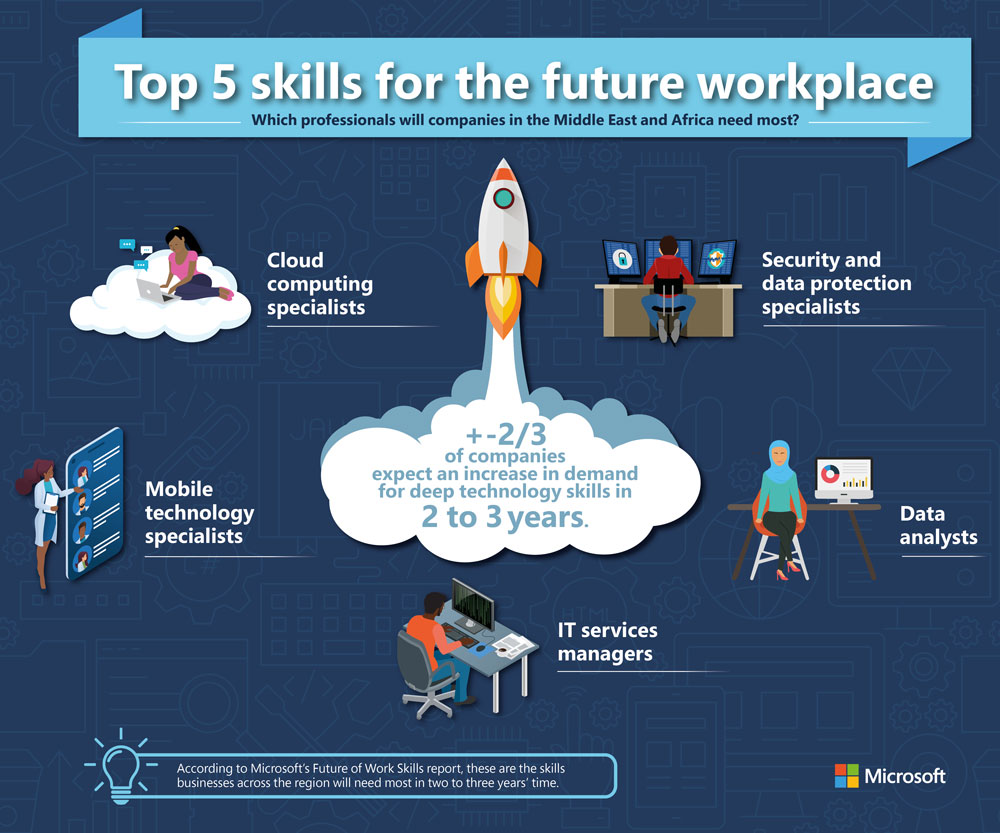
Growth of the region’s digital economy hinges on the development of key skills
Digital transformation is well underway in organisations across the Middle East and Africa but a gap in key skills is hampering progress
In 1712, British engineer Thomas Newcomen altered the course of history when he released a prototype of the first steam engine. It was a discovery that would help usher in one of the greatest periods of economic progress the world has seen. But it took half a century for the Industrial Revolution to spread beyond Britain – a direct result of the time it took for other countries to build the relevant skills in their countries.
Fast forward to 2020 and the world has entered another period of revolutions, and skills are once again the currency through which businesses will progress. However, in contrast to the 1700’s, companies don’t have 50 years to acquire the skills they need.
“We need to develop a skills roadmap for current decision makers and future generations across the region,” says Jaime Galviz, chief operating officer and chief marketing officer, Middle East and Africa, Microsoft. “A roadmap that shines a spotlight on the digital transformation challenges we face, details how we can go about solving these challenges, and also enables us to embrace new opportunities we’ve never even thought of.”
To better understand the nature of the skills shortage in the Middle East and Africa (MEA), Microsoft commissioned the IDC to conduct research across a range of different industries in various markets. Extensive interviews were carried out with 280 IT decision makers in companies ranging from 100 to more than 250 employees.
Skills key to further progress
Arguably the most important finding in the report is that basic digital skills are no longer enough to drive digital transformation. As a result, businesses are experiencing a major spike in demand for more advanced tech capabilities. Roughly two thirds of companies in Turkey, South Africa and the UAE expect to see an increase in positions that require deep technology skills within their organisations in the next few years.
“The IDC Survey highlights that organisations’ digital transformation aspirations are being held up by a shortage in digital skills. The skills shortage in cloud, networking and emerging technologies like AI, machine learning and blockchain hampers the adoption of these technologies, which are key enablers of growth and digital transformation,” says Manish Ranjan, programme manager for Software & Cloud, IDC Middle East and Africa.
Not surprisingly, companies say the number one challenge they face in acquiring digital skills is finding the right level of experience. By definition, new technologies cannot have people with much experience. This is further complicated by the need to merge these deep tech skills with business-specific skills. Looking at the responses from Turkey, this results in almost 60 percent of organisations battling to acquire the skills they need.
Looking to external sources of talent
According to decision makers within the region, there are two particularly effective ways of tackling the skills challenge. The most popular of these is to source talent externally. At least 60 percent of South African organisations find it effective to hire individuals that already have the right level of experience from other industries – a trend we see reflected in markets across MEA.
To advance their capabilities in new technology like AI, business leaders are also increasingly looking to alliances with external partners. This enables them to tap into a larger pool of capabilities and talent, reducing the time it takes to deploy working solutions.
The challenge with this approach in isolation is that it doesn’t contribute to the growth of the regional skills pool. This then creates intense competition to attract and retain a relatively small pool of talent, ultimately derailing the business’ ability to maintain an adequate pipeline of skills.
A good balance between recruitment and development
But it’s encouraging to see many businesses are not relying solely on external sources of talent. In fact, the second most effective way of accessing digital skills is to upskill existing staff. As many as 76 percent of organisations in Turkey are actively upskilling their employees. And this number is equally significant elsewhere in the region.
Businesses are undertaking these upskilling ventures in different ways. Last year, Etihad Airways launched the first-ever in-house AI Academy in the region. Through the Academy employees are given access to online training programmes and instructor-led classes to nurture company-wide AI competence.
Mapping a way forward
Another valuable insight around closing the skills gap is the necessity of collaboration. In fact, organisations widely view education programmes, supported by funding from international organisations, as key to overcoming digital skills challenges.
And for good reason. Programmes driven by the tech industry are gaining good momentum. Cloud Society, for example, is a one-stop learning platform aimed at honing employees’ digital skills by offering a range of free courses and certifications from Microsoft Partners. Thanks to the easy accessibility of Cloud Society and its ability to scale through partnerships, more than 150, 000 IT professionals in MEA have been trained.
The platform is particularly geared towards supporting the region’s aspiring cloud computing specialists – an important area of focus as high percentages of businesses across the region race to deploy cloud technology.
“Businesses clearly have a firm grasp of skills they need to compete in the Fourth Industrial Revolution. And the intense focus they are placing on acquiring these skills is a promising sign we’re progressing in the right direction,” says Galviz. “But the responsibility cannot lie with business alone. Public and private-sector entities must throw their weight behind initiatives that focus on skills for tomorrow if the region is to truly thrive in the new digital economy.”












![A security team analyses key data from a visual dashboard.]](https://news.microsoft.com/wp-content/uploads/prod/sites/133/2023/04/Security-Sprint_TL_Banner-Image-519x260.jpg)



